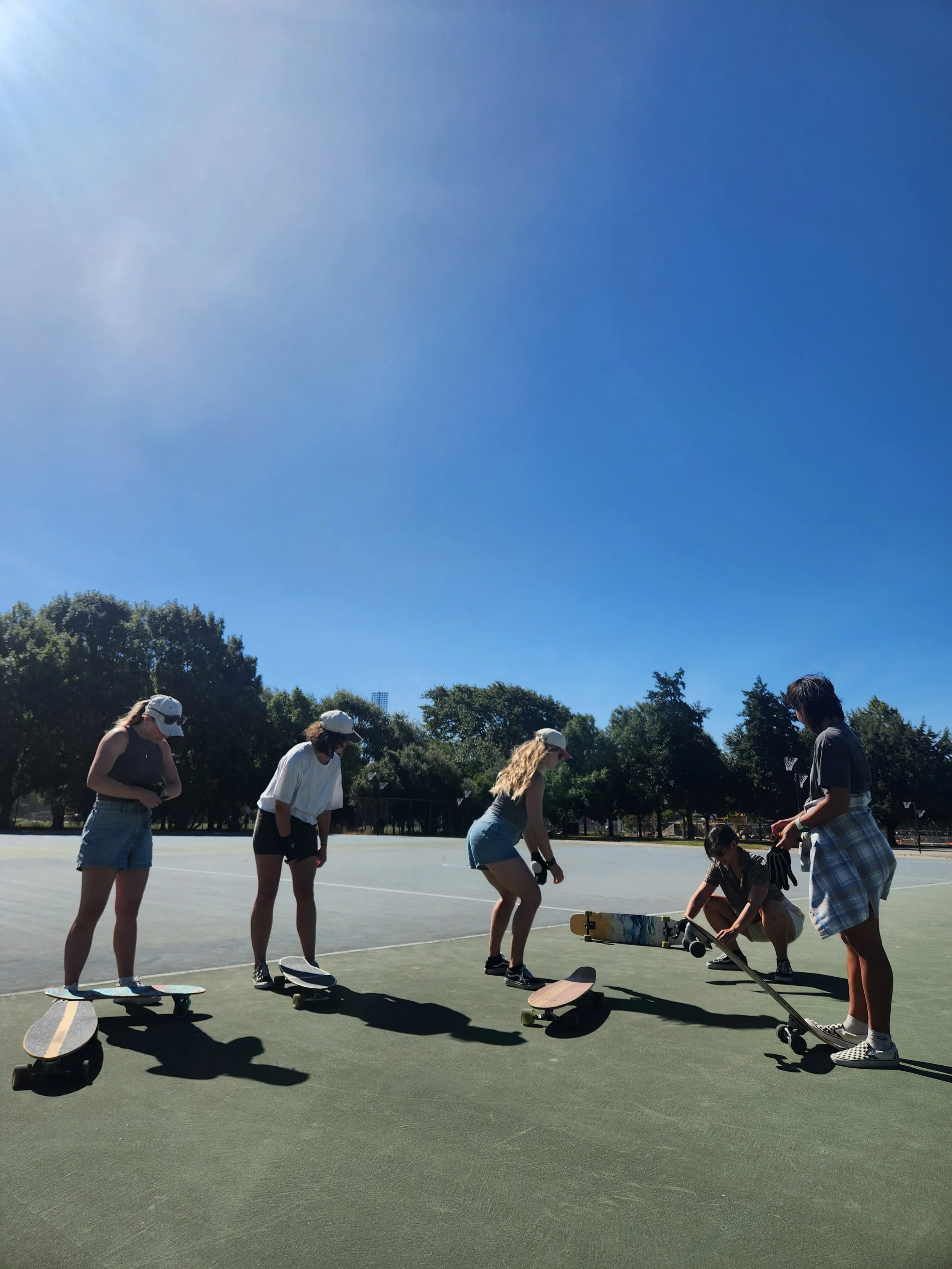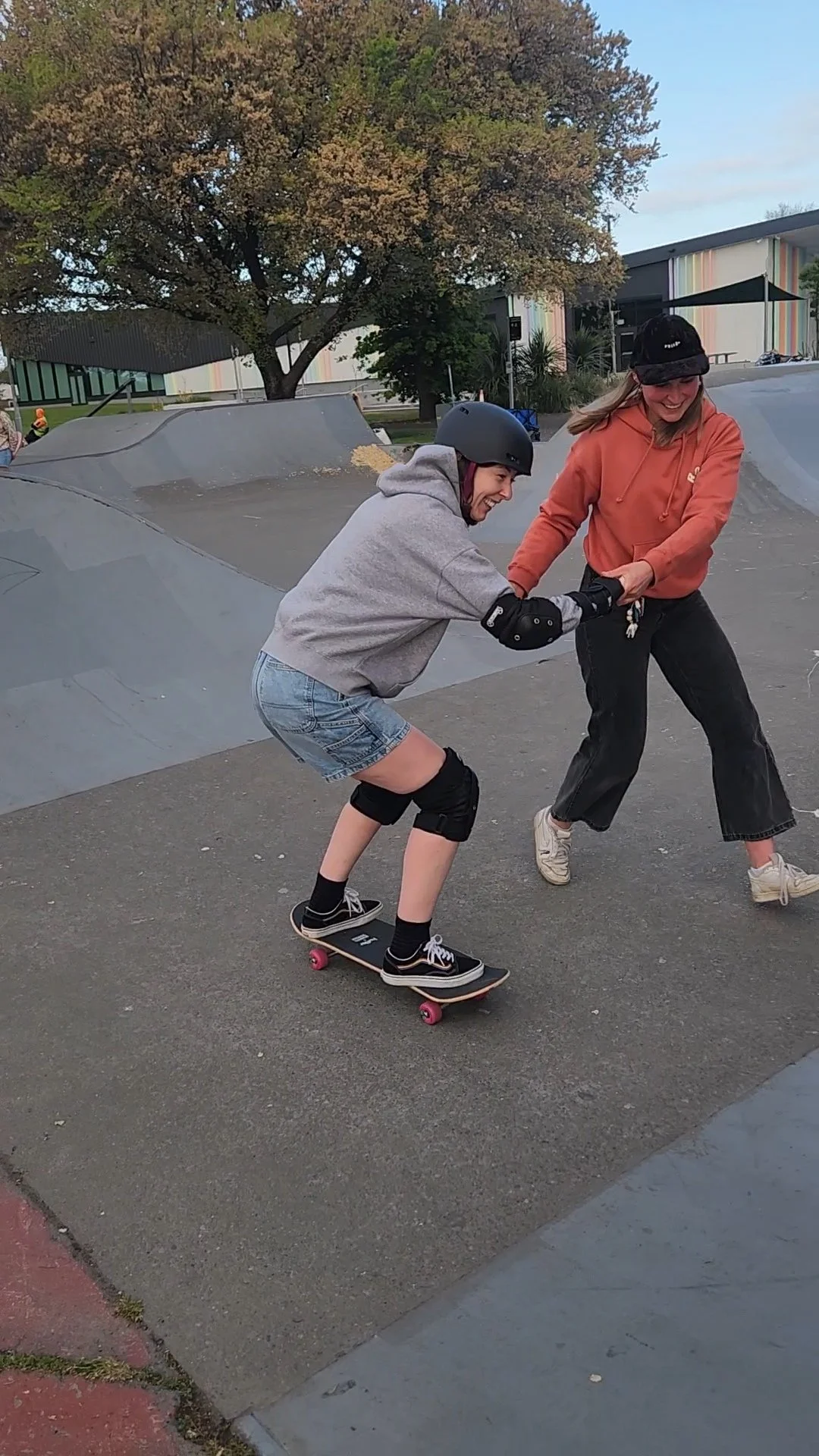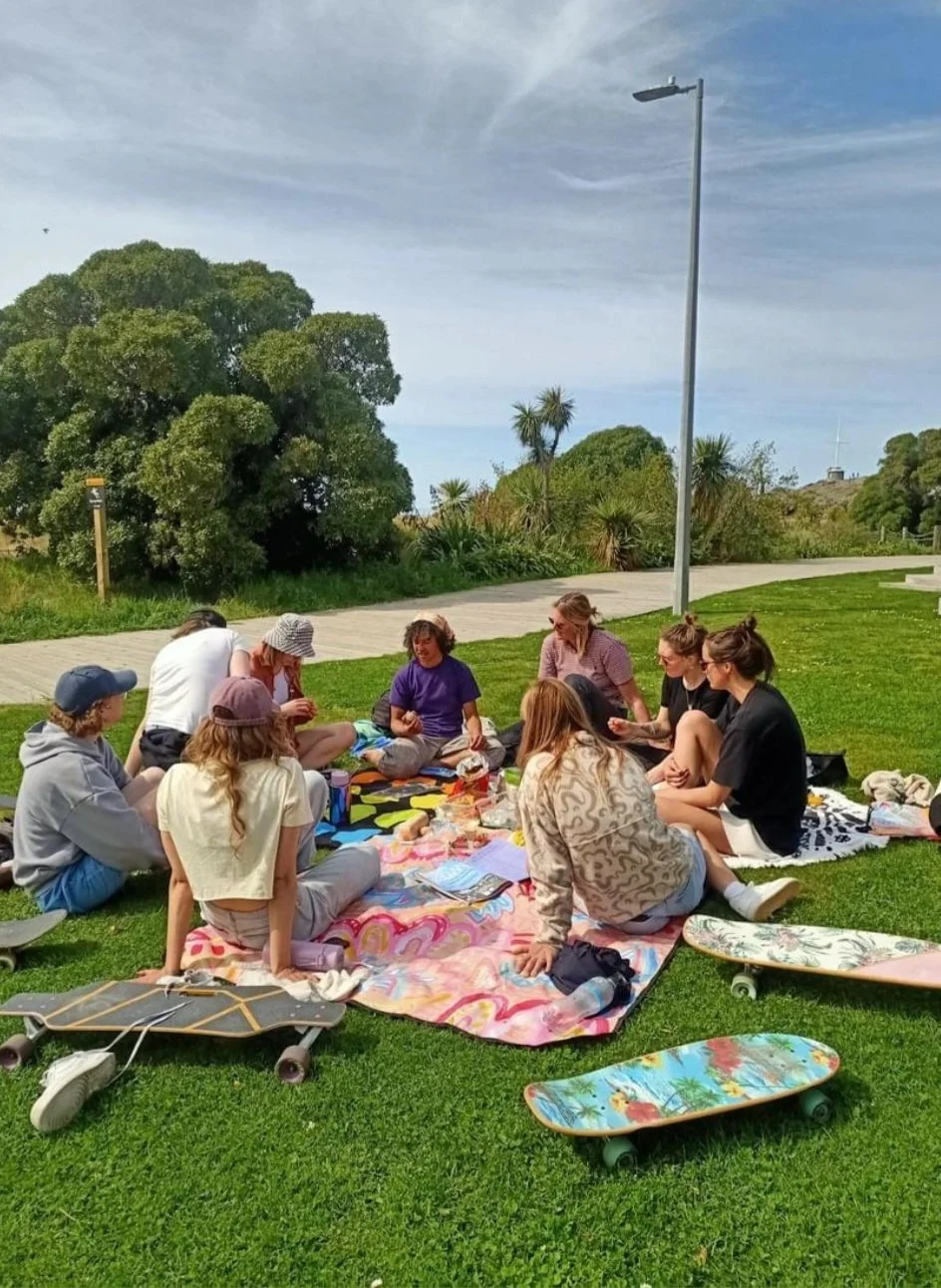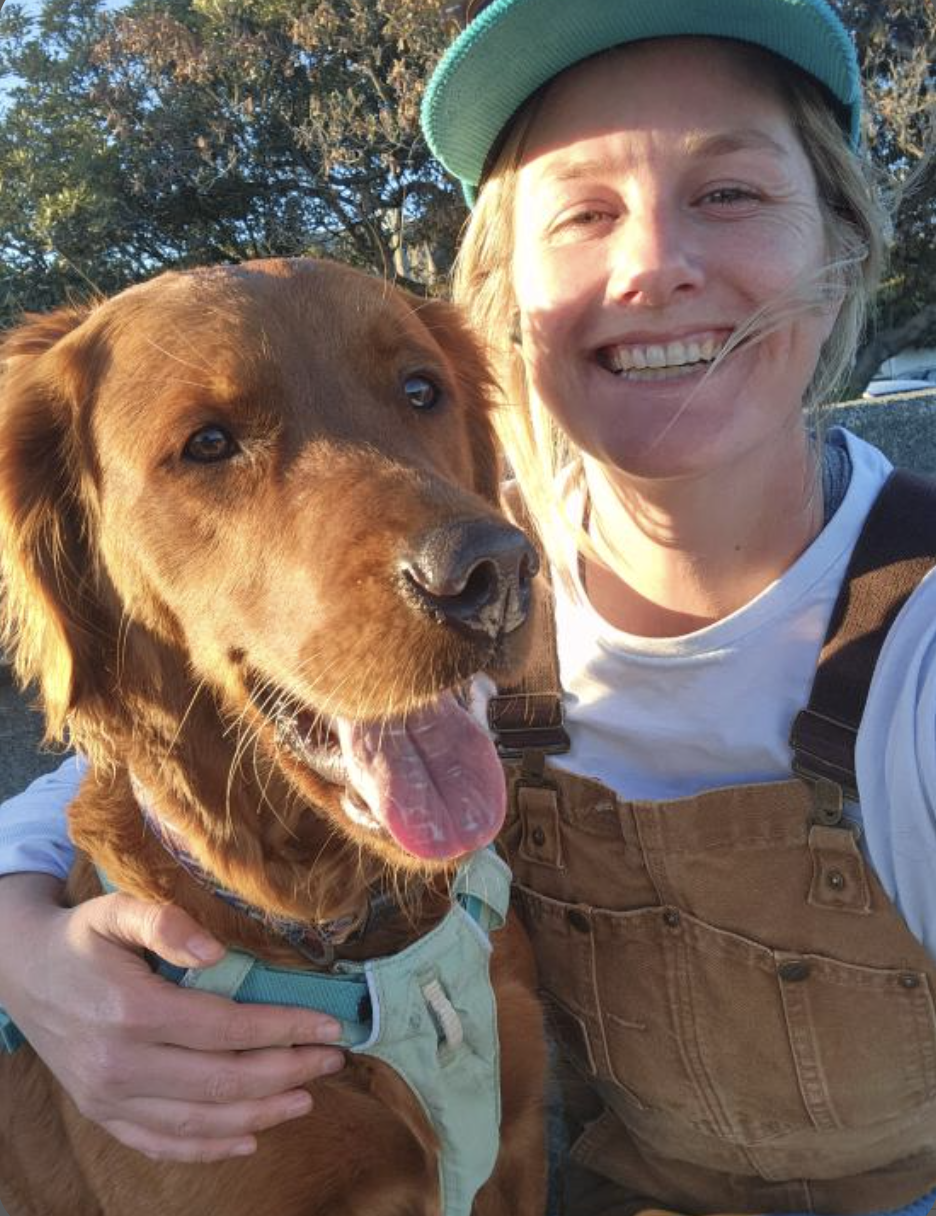Girls do skate
Georgie Kirkland has always been sporty, finding both solace and camaraderie in spending as much time as possible outside.
But when her family moved to France when she was 10, her lack of parle français prevented her from joining any sports teams.
Instead, she headed to the local skatepark. She was often one of the only girls there, apart from an older woman who showed up after work hours.
“This super feminine-looking lady would take her earrings out and go for a skate,” Georgie says. “I thought she was the coolest lady I’d ever seen.”
Years later, and back in her hometown of Ōtautahi, Christchurch, Georgie and her friends would yarn about how male-dominated the skate scene still was. They all thought it was weird that there weren’t enough girls out in the skateparks or cruising along streets on boards.
“I wondered, if we’re feeling this, would other girls around the city also be feeling that way?” she says. An idea was born.
Then, after an afternoon of giggles, laughter and living in the moment, teaching her friend Elle to skate, the two women wondered about sharing this joy and hype for skating with others.
“We saw how much joy it brought us, especially as it’s such a sport where you have to be present and connect to the flow state. Like you can’t think about all the things you’re worried about in life while also trying not to trip up on that pebble on the skateboard,” Georgie explains.
“I connect through it for mental health,” she says. “And I thought, if I do, why would that not be for other people as well?”
Since 2023, Georgie has been building community and connection by getting more girls out skating streets, shredding slopes, and surfing waves through the Indy Project.
Twenty or so girls showed up for the Indy Project’s first ‘Skatebirds’ session back in May that year. Now, the people who attended the very first sessions are helping Georgie run the project. “It’s grown into something really beautiful,” she says.
Girls who didn’t even know how to push on a skateboard are now dropping in on the halfpipe. ”It’s been really interesting with The Indy Project, seeing the confidence of girls just being around girls,” she says. “Like you try things you wouldn’t normally try because you’ve got a hype team around you, or you’ve got someone’s hand to hold. There’s no element of being intimidated, which I think is the reason so many girls don’t do it.”
New friendships have bloomed. Girls will often skate outside of the organised events, and collab with Garden City Sessions, another skate group in town. “The majority of girls who’ve come to the Indy Project have turned up alone,” she says. “I rate that, you don’t know anyone, you haven’t done the sport before, and you just turn up.” Girls can do anything.
There are also surf and skate branches to the project. Seabirds, founded by Brittany Andrews in 2020, focuses on getting wāhine into the water on boards. Each year, the whole group tries to do an Indy Day where they ski or snowboard, skate, and surf all in one day.
These board sports are Georgie’s way of showing up for her inner child, a core connection she works to care for daily. Her favourite style of skating right now is surf-skating, with solid rhythm and pump action needed to move the board. “I’m too lazy to push all the time!” she shares with a laugh.
A lot of the Indy skaters are women and non-binary people in their late 20s to early 30s. “This is a really hard age to meet new people,” Georgie says. “And it’s the age we’ve always been told to start families, lock into careers, buy houses. But if that’s not what you’re wanting to do, you can feel a bit disconnected from those friends you’ve always had.”
For most of her 20s, Georgie was riding the travel wagon overseas. Although Europe had a few too many cobbled streets, she’d skate whenever she could, collecting board stickers along the way.
New Zealand called her back for its outdoor lifestyle and the promise of a dog if she stayed put long enough. She’s now settled in the seaside suburb, Sumner, with Sally, her rustic retriever. “I’ve always been quite connected to community, and Sumner has that,” she says.
Georgie believes having a community like the Indy Project brings people outside of the “traditional” trajectory of life together. You can connect with others outside of, asking, ‘So what do you do for work?’ Instead, it’s ‘how’s your skateboarding going, what do you love. What do you do for fun?’ Then you actually see what people are about, she says. “It’s not so deep, it’s a way to breathe.”
“Finding a community through a sport is awesome, and board sports draw in different people - you don’t have to fit into the traditional sports like netball or hockey too,” she adds.
Skateboarding is also very accessible. All you need is a board, and then you’re off.
Georgie has been collecting protective gear and a heap of boards for people to borrow and try out. To see what kind of skating they like. This community sharing is part of the inspiration for Georgie’s next venture, Boz.
Boz is a peer-to-peer borrowing and lending platform, which Georgie hopes will also inspire people to get to know their communities. “I’ve always been passionate about community, and it just seems weird that we now live in a time where we don’t necessarily know our neighbours, you can’t just pop next door to borrow some sugar.”
“Boz has been in my head for years,” she says. One day, when travelling by a lake overseas, she saw a kayak on the shoreline and thought, ‘if only I knew whose kayak that was, I could put 10 euros in their pocket and just borrow it for half an hour.’
“Why do we not connect that way?” Georgie wondered. “Why does everything have to be through a company that we hire things from?”
Like how Georgie lends out her skateboards, Boz is also a way to be more conscious about consumerism. You can try something before you buy. So, then it’s not just sitting stored in the garage collecting dust and storing regret. You could lend lawnmowers and borrow tools. Or even, share items to encourage new experiences, where people can borrow, say, a couple of stand-up paddleboards for a date. “Tinder’s the old thing. Boz is where you create the fun date, and they remember it,” she says. Boz will be soft-launched as an app this month. Watch this space.
Every time Georgie organises a skate event, she worries that no one will turn up. “This feeling hasn’t gone away, even after a few years in,” she says. But people always do. And she can’t believe the people the Indy Project has attracted. “Everyone is just awesome,” she says.
New members, and especially beginners, are always welcome. “You do need to fall over a few times to get past the fear. You’ll get a few scrapes,” she says. “But then, there’s this real element with skateboarding, where you can progress in the smallest way, but it feels like the biggest achievement,” she says. “You just want to chase that validation as it feels so good.”
Now, as Georgie and her skater gang glide along the seaside esplanade in Sumner, she’ll often hear a dad tap his little daughter’s shoulders as they pass, saying, “That can be you.”
It’s a full circle moment.





